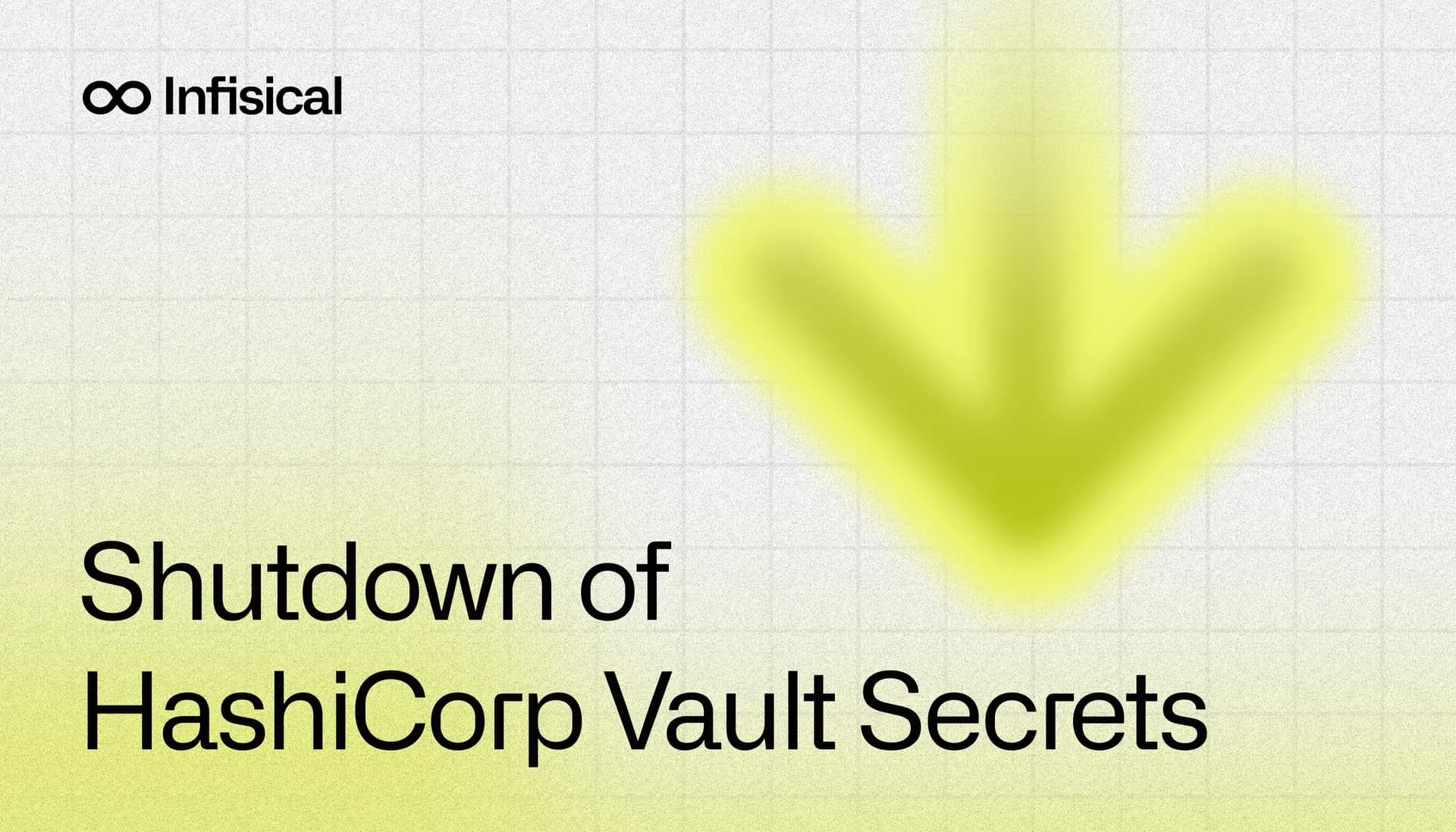- Blog post • 6 min read
HashiCorp Vault Secrets is Shutting Down: Migrating to Infisical
- Published on

HashiCorp Vault Secrets was HashiCorp's managed secrets management service that provided centralized storage, access controls, and audit logging for application secrets and sensitive data. On June 30th, 2025, HashiCorp decided to sunset the product.
There were many advantages to HashiCorp Vault Secrets. As a cloud-hosted version of their Vault product, it offered organizations a way to manage secrets without the operational overhead of self-hosting, featuring integration capabilities with various infrastructure tools and compliance-focused features like granular permissions and detailed audit trails.
With HashiCorp closing this service, organizations must now evaluate alternatives that can provide similar functionality while potentially addressing some of the limitations they experienced with the product too.
These alternatives generally fall under three categories:
- Managed Secrets Platforms: Third-party services that handle infrastructure and maintenance, offering reduced operational overhead with varying levels of feature complexity and developer experience
- Open Source & Self-Hosted Solutions: Self-managed tools providing full control and customization but requiring internal expertise and operational resources
- Cloud-native Solutions: Provider-specific services that integrate deeply with their respective cloud ecosystems but may limit multi-cloud flexibility
Let’s discuss the best options across all three of these categories.
Managed Secrets Platforms
Managed secrets platforms are best for two reasons: they have faster time-to-value because of the ease of implementation and lower long-term operational complexity. Secrets management is a fairly complex problem and isn’t often worth the bandwidth of an engineering team otherwise focused on their main product. Accordingly, managed secrets platforms is often best bet. Of course, using a managed secrets platform requires commitment to the approach, as they’ll naturally exhibit some measure of vendor lock-in.
Infisical (Managed Version)
We are obviously biased as the developers of the Infisical platform, but there are a few design decisions that make Infisical stand out compared to HashiCorp Vault Secrets. One of the biggest is the low operational cost of running Infisical. Infisical is a developer-experience first platform – it is easy to roll-out and manage through Infisical's intuitive UI, API, CLI, SDKs, Terraform provider, and more. Infisical provides an end-to-end set of tools that cover all aspects of secrets management: from encrypted version-controled secret storage, to dynamic secret management, to integrations across infrastructure, to secret scanning, leak prevention, and certificate lifecycle management.
Additionally, our pricing is transparent and developer-friendly, and we retain strong third-party integrations across developer tools. We are also open-source, and discuss our open-source offering more in the next section.
HCP Vault Dedicated
The most natural suggestion for users offboarding from HashiCorp Vault Secrets is to use HashiCorp’s Vault Dedicated platform. However, this is only due to the product being created under the same roof. The Vault Dedicated platform has high-operational complexity, inherited from Vault’s complexity. Vault is often presented as an easy platform to integrate, but a lot of edge cases can arise.
Additionally, HCP Vault has infrastructure-based costs, resulting in premium pricing. Conversely, this cost may be justified for HashiCorp power users as HashiCorp Vault Dedicated has a strong integration with HashiCorp’s greater ecosystem.
Open Source & Self-Hosted Solutions
For many teams, going open-source is the correct decision to maintain full control over infrastructure and data residency. While open-source is, by nature, more of a hassle than a managed solution, it can be best for teams that have strong processes around deployment, maintenance, and security.
Infisical (Open Source)
Infisical is open-source software under an MIT Expat license. While it has more operational complexity than the managed offering, Infisical Self-hosted is able to provide full-feature parity with the managed version. Accordingly, Infisical’s open-source deployment includes secrets management across infrastructure, private certificate management, SSH credential provisioning, and a robust key management system. It also features an active community of contributors.
SOPS
SOPS, which stands for Secrets OPerationS, is a more minimalist and manual way of managing secrets. It is a CLI-focused application that makes it easy to decrypt a file with one of many available keys. However, SOPS is not a direct replacement for a product like HashiCorp Vault Secrets or Infisical—instead, it’s more an encryption and decryption approach that makes key management more flexible.
External Secrets Operator
External Secrets Operator is a Kubernetes-only open-source mechanism for injecting secrets into Kubernetes. However, external secrets operator is not a standalone product, instead it integrates with tools like AWS, GCP, or Vault to store the underlying secrets. Instead, it is more the actual exchange layer.
Cloud-Native Options
Large cloud providers like AWS and Azure have secrets solutions built into their cloud ecosystems. These cloud solutions can be cost-effective at times. However, they are often limited in features as they serve as a basic-layer for secrets atop cloud operations. Accordingly, users of HashiCorp Vault Secrets are likely more interested in aforementioned solutions if they previously saw interest in HashiCorp Vault Secrets.
However, these cloud native options are still worth discussing.
AWS Secrets Manager
AWS Secrets Managers (or ASM) is the AWS native way to store static key-value pairs. It has very limited functionality. For instance, it supports key rotation, but only for RDS. Otherwise, key rotation functions have to be custom-written. It’s priced on a per-secret basis which can be expensive for organizations with sprawling stacks.
Azure Key Vault
Azure Key Vault is more fleshed out than AWS’s corollary. It includes support for managing SSL certificates and is able to store secrets in HSM modules. However, it does not have the same rotation and dynamic secrets features as a solution like Infisical.
Choosing the right platform for you
To summarize, there are few types of platforms:
- Managed Platforms: Best for teams prioritizing ease-of-use and quick deployment
- Open Source: Ideal for organizations requiring full control and customization
- Cloud-Native: Perfect for single-cloud environments with deep provider integration
If you’re using or depending on HCP Vault Secrets, it’s critical to start the migration now—before August 27, 2025. Infisical offers a robust, developer-friendly path forward, with smooth integration for existing Vault workflows. For most organizations migrating from HCP Vault Secrets, Infisical provides the optimal balance of simplicity, security, and developer experience without the operational complexity of traditional enterprise tools.
If you need help with the migration, please don’t hesitate to reach out to support@infisical.com. For any questions regarding pricing options, please refer to sales@infisical.com.

